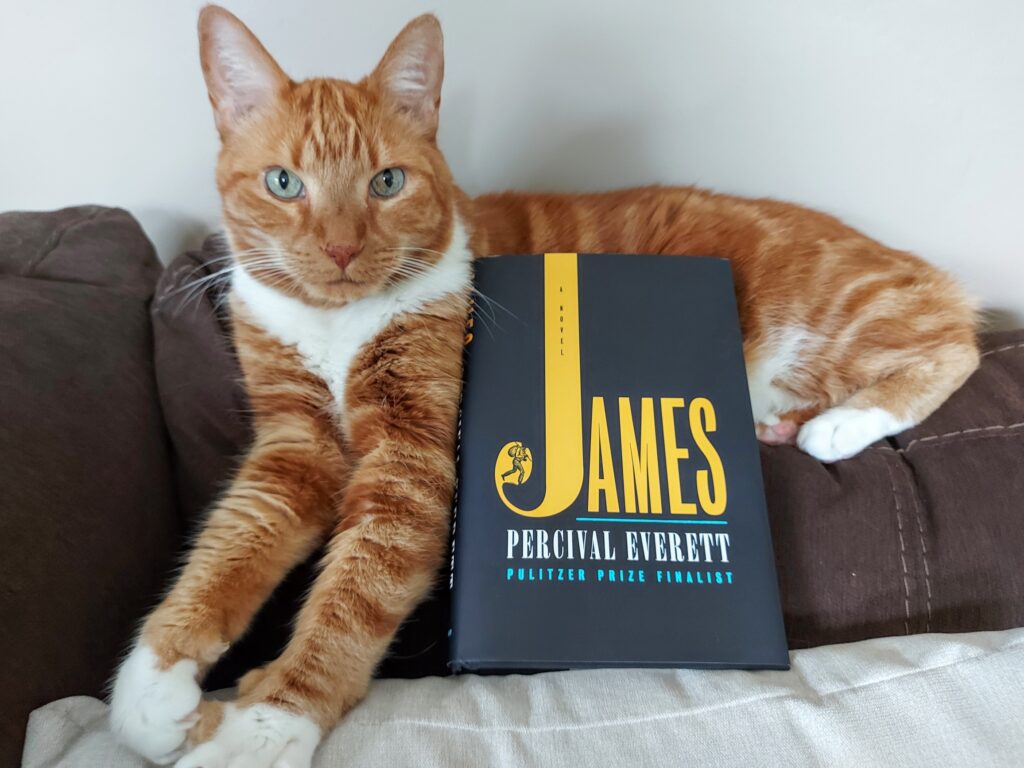James by Percival Everett

You have probably heard of Mark Twain’s Adventures of Huckleberry Finn, a story about a runaway boy, Huck Finn, and a runaway slave, Jim, who decide to sail down the Mississippi River to the free state of Illinois. Adventures of Huckleberry Finn is considered to be an anti-racist book, despite its heavy use of a certain racial slur (I should point out that this slur also appears quite frequently in James as well), and the character of Jim is depicted as honorable and intelligent, albeit gullible and loyal to Huck even after Huck plays tricks on him. James is a reimagining of Huck and Jim’s adventures told from Jim’s perspective, and it tells a more authentic story about slavery and the deep-seated racism of the South, something that I think only a Black writer can do. I found James to be an uncomfortable read, but it is also a very interesting story that I recommend whether or not you have read Adventures of Huckleberry Finn.
Jim, who prefers to be called James, is the slave of Miss Watson, one of Huck Finn’s guardians. James is married to another slave, Sadie, and they have a child named Lizzie. When James finds out that Miss Watson is going to sell him, he decides to go on the run with the desperate plan of making it to one of the free states where he will earn money so that he can buy his wife and child’s freedom. Huck, meanwhile, has also decided to run away, not only because his abusive father has come back to town but because he wants another adventure, and so he fakes his own death. This leads to everyone thinking that James killed Huck, so not only is James being hunted as a runaway slave, but he is also being hunted for murdering a white boy.
James and Huck’s adventures on the Mississippi River are similar to that in Twain’s novels, except when they are separated the story follows James’s movements instead, and every situation he finds himself in is highly charged with racist danger. For example, he is at one point bought by a white man who leads a group of white minstrels who perform so-called Black songs in blackface, so he must pretend to be a white man pretending to be a Black man, which is a hanging offense if he is caught.
James is at his heart a good person, like Jim in Adventures of Huckleberry Finn, but by telling this story from his situation, we see a Black man forced to do certain things to survive, not just for himself but also for his family, that make him question whether he is any better than a white slaver. As for his relationship with Huck, which had me wondering why James didn’t just ditch Huck as he knew travelling with a white child was dangerous for him, Everett posits an eyebrow raising explanation that adds to the conflict between Huck’s sense of morality and the values of the society that he lives in, and his conflicting feelings towards his “friend” Jim.
Everett’s prose is sparse and to the point, which makes sense as a man is literally running for his life, so there is no time to reflect on the majesty of the Mississippi River or the beauty that can be found in the South despite the ugliness of slavery. James is a fast paced read and I found the ending to be somewhat abrupt, but the ending of this novel makes more sense than the “happy” ending Jim got in the Adventures of Huckleberry Finn. James is not meant to assuage white feelings. It should make you feel uncomfortable, and it should make you question the current attempt in the US to erase the horrors of slavery from history just so white people do not have to feel bad about themselves. I do not think white people should feel bad for being white, but I think they should stop being racist asshats.